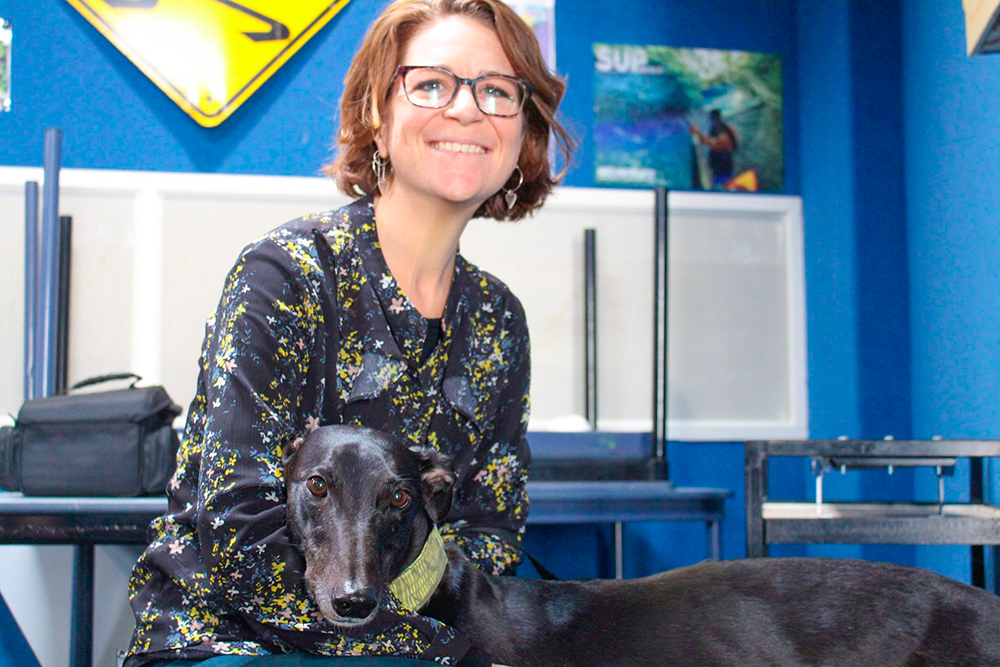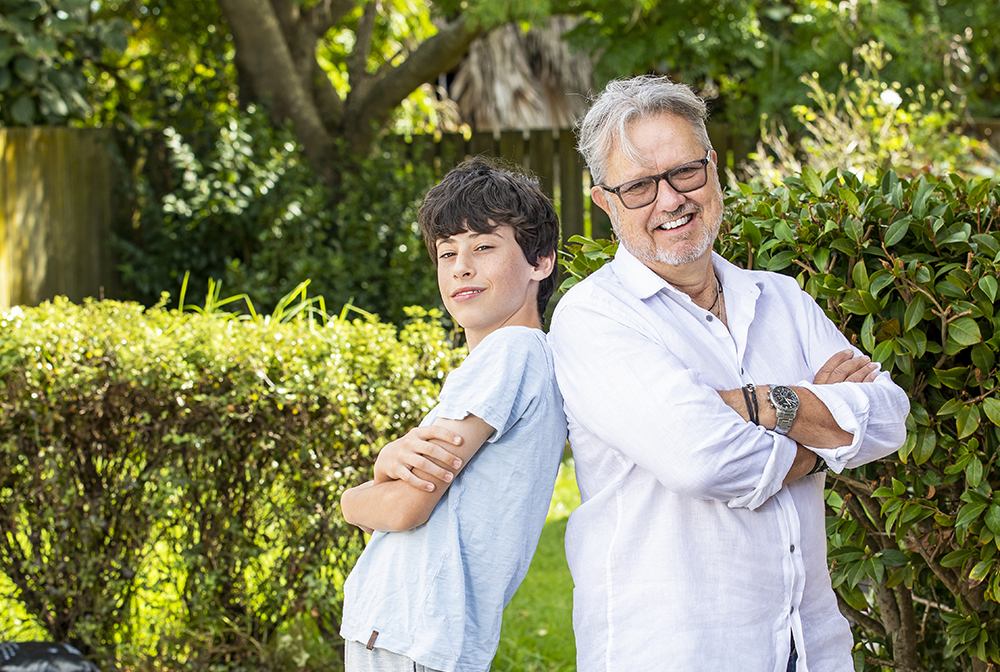When rescued greyhound Āki joined Pip Speedy’s life, there were many new and over-whelming things to get used to, like his first time inside a house and car, and the first trip to the beach. But very quickly Āki was loving life as a pet and ready to tackle the next big milestone, his first day at work as a therapy dog with high school counsellor Pip.
“He’s a great buddy and a great friend, but as a counsellor seeing the impact a dog can have in that environment is the biggest thing for me,” says Pip, who works at Auckland’s Orewa College. “I watch a lot of students come to counselling nervous and unsure, but when they interact with Āki or pat him, it’s naturally calming and a great way to settle in.”
The helpful hound has been so effective at supporting students, Pip regularly finds herself taking cues from him.
“He’s very good with tears,” she explains. “Students feel he cares and sometimes it’s easier to feel that from an animal than a human. It’s a vulnerable space and animals can make you feel safer, so I often follow Āki’s lead.”

Formerly known by his racing name, All Day Long, Pip, 42, adopted Āki through the organisation Greyhounds As Pets, which is devoted to avoiding unnecessary euthanasia by rehoming ex-racing dogs.
“It’s like a dating service for humans and dogs to get the right fit. They do temperament testing, and check how they are with children and cats etc,” says Pip, who chose the breed following lots of research as they’re famed for their easy-going disposition and have a proven track record as therapy dogs.
After adopting Āki, Pip put a comprehensive proposal to her school’s Board of Trustees, explaining the benefits of therapy dogs, and was thrilled when she got the go-ahead.
Pip was prepared for some serious training but found Āki was naturally obedient and intuitive about not approaching students when not welcome. Help from a police dog handler friend confirmed Āki was ideal for the school environment.
“He’s made me a better counsellor and a lot more mindful,” says Pip, who became a high school counsellor after 17 years as a primary teacher. “Just human to human, it can feel awkward for the student to sit there in silence, but with a dog in the room, it’s more comfortable for them to be with their feelings and allow whatever needs to come up.”
Pip adds that Āki’s presence has been particularly helpful for anxious students returning to school after Covid closures.

Pip and Āki are a popular sight around school.
“After lockdowns, some students are struggling with anxiety or unsure about class, so I offer that Āki walk them there. If it’s just me, they’re like no, but with Āki, they accept. Before, students sometimes ignored me out of awkwardness but now they will approach me around school when I’m with Āki. It can open a conversation about who I am and where to find me.”
Therapy isn’t Āki’s only skill; he also understands te reo Māori – a personal passion of Pip’s – and has become an excellent advocate of the language.
“Initially, it was partly selfish because I wanted someone to talk to in Māori,” says Pip, who speaks exclusively to Āki in te reo.
Her journey with the language began in her own high school days and in more recent years she’s been studying at the local community marae Te Herenga Waka o Ōrewa, which welcomes everyone regardless of iwi affiliations or ethnicity.
Pip loves the language and culture so much, she’s on the board of the marae and as a teen desperately hoped she’d find tūpuna Māori (Māori ancestors) in her family tree.
“I’ve done a deep search since and I don’t, so I’ve found my identity as a tangata tiriti [person of the treaty] and being a haumi, or an ally, where I do my best to at least promote language and equality.”
And it’s been a huge hit with students and colleagues alike, who love seeing Pip and her clever dog’s linguistic talents.

“First, I taught Āki his commands in te reo, then when I brought him to school, I realised what a great promoter he is. People now know words like moenga [bed] or harirū [shake], and they want to see it again and again.”
It’s been particularly supportive for Māori students, who are often the minority.
“They can feel like they have to adapt or sometimes hide that part of themselves, especially in a school that is predominantly Pākehā,” says Pip. “It makes a big difference when they feel like their identity and entirety of who they are is welcomed.”


